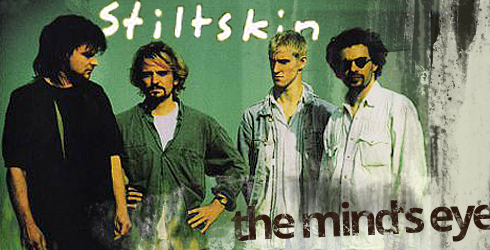- Article
- Read in 11 minutes
Stiltskin – The Minds Eye – review
Before Ray Wilson joined Genesis he was the singer with the grunge band Stiltskin who shot to fame overnight when their song Inside was used for a jeans commercial. Ole Uhtenwoldt has listened carefully.
In the early 90s there formed an indie/grunge band called Stiltskin. When Ray Wilson joined them as the singer in 1994 nothing prevented them recording a debut album. Released as The Mind's Eye the album is common knowledge among all Ray Wilson fans – not least because of the single success of this one song…
The mind's eye – that is the motive of the cover in a fairly direct way. With a clear green as the dominant colour it has a somewhat mysterious effect, which corresponds to the content, and the lyrics, of the album, but also contrasts it. The Mind's Eye is direct, straightforward and knows where it wants to go. The sound goes straight under your skin; it is this straightforward manner that makes the album special. It may look like a simple indie rock or grunge album at face value, but closer inspection reveals that there is more to it that meets the ear. One has to penetrate the facade to discover the feeling behind the rough and aggressive parts. To achieve this, however, one needs to feel the album rather than listen to it.
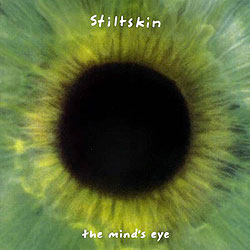 The special sound that lends character to the album is achieved mainly by the four-piece Stiltskin. They sound well-adjusted to each other, the roles are distributed clearly. The front man is Peter Lawlor; he plays the guitars that assume a central position on the album. Most of the lyrics and songs were penned by Lawlor and became the foundation for the band. Ray Wilson proves a terrific singer and does a flawless job on the album. He sounds excellent in quiet, tuneful songs as well as in rough and ready numbers, proving his versatility as a singer. What he achieves on this album can easily be perceived as the public beginning of an impressive solo career. An earlier album called Swing Your Bag he did with a band project called Guaranteed Pure in 1993 sank without a trace.
The special sound that lends character to the album is achieved mainly by the four-piece Stiltskin. They sound well-adjusted to each other, the roles are distributed clearly. The front man is Peter Lawlor; he plays the guitars that assume a central position on the album. Most of the lyrics and songs were penned by Lawlor and became the foundation for the band. Ray Wilson proves a terrific singer and does a flawless job on the album. He sounds excellent in quiet, tuneful songs as well as in rough and ready numbers, proving his versatility as a singer. What he achieves on this album can easily be perceived as the public beginning of an impressive solo career. An earlier album called Swing Your Bag he did with a band project called Guaranteed Pure in 1993 sank without a trace.
Another important part of the band, especially where rhythm is concerned, is its drummer Ross McFarlane. He plays mainly in even-numbered rhythms and delivers solid work. His drumming works well with the input of bass-player James Finnigan, who also seems to be into clean rhythms and clear beats; you can hear that in his bass lines. He doubles as keyboarder, where he sticks to the Hammond organ that provides a backdrop for the guitars. Several guest musicians complete the album. Tessa Sturridge provides backing vocals, as does the Ambrosian Choir. Sian Bell adds cello parts to several songs.
The question remains whether this album is not really rather a Peter Lawlor solo album. After all, he did write all the songs on his own. The Mind's Eye is clearly an album for a band with a firm line-up without which the album could not have happened. Both style and mood match later Stiltskin albums, so that this album sort of paves the way for what would be coming from the new-formed Stiltskin without Lawlor.
One cannot help avoiding it with Ray Wilson's solo album Change (2003) either. The structure basically the same for both albums; a brief introduction precedes songs with similar styles. Change is mainly described in acoustic and meditative parts while The Mind's Eye sticks to a strong rock landscape. Both albums ends with a long instrumental without an obvious structure.
The album offers an interesting range of acoustic details in its runtime of some 40 minutes: :
Intro
Mysterious and secretive – this is probably the best description for this track. In reality there is hardly more to it than its title reveals. This thirty-second snippet is the introduction into the album. There is white noise, a distant choir, a tension builds despite the brevity. The structure becomes more dense, the sound focuses on one point and you realize instinctively that something is up. You will still fall of the couch when it happens!
Scared Of Ghosts
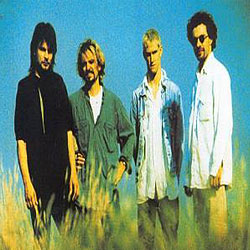 The intro suddenly stops and moves into a song that is carried by the guitar. A rock scenery is sketched outlining the direction this album will take. After a tune on the electric guitar that seems tailored to an opening song it all calms down a bit and an easy rhythm with a clear bass line combines with Ray Wilson's natural voice. The lyrics talk about fears one encounters and tries to get rid of before they take over one's life. The chorus sounds very hard again despite its optimistic touch. A brief guitar solo right before the final chorus completes the song. The song could fade out then, and one would actually expect that, but it has a full-stop ending instead.
The intro suddenly stops and moves into a song that is carried by the guitar. A rock scenery is sketched outlining the direction this album will take. After a tune on the electric guitar that seems tailored to an opening song it all calms down a bit and an easy rhythm with a clear bass line combines with Ray Wilson's natural voice. The lyrics talk about fears one encounters and tries to get rid of before they take over one's life. The chorus sounds very hard again despite its optimistic touch. A brief guitar solo right before the final chorus completes the song. The song could fade out then, and one would actually expect that, but it has a full-stop ending instead.
Scared Of Ghosts is a strong song that would fit in any Stiltskin show today and perhaps be a positive surprise at that. It sort of heralds the opening songs of later Stiltskin albums like Fly High on She and Accidents Will Happen on Unfulfillment.
Horse
The next track is about the burden of responsibility, under which someone breaks down. It begins with a tragic tune on the electric guitar that is actually the foundation for the verses. It all sounds very emotional until after the bridge ("I don't want to be responsible") when the big break and the chorus occur. Like a thunderstorm all the pressure breaks out and brings out the grunge sound. The vocals are very impressive and illustrate Ray Wilson's ability to vary his voice. The song feeds on this power and the alternation between loud and quiet, between tension and release. There is also a cello solo as a contrast to the destructive energy of the chorus. The song ends again with an abrupt final chord. It may take several run-throughs to really get the sentiment of the song, but there is much more emotion in the song than is apparent to the eye.
Rest In Peace
As dark as the title reads, this is actually a song that is, dare we say, rather harmless. It makes for a nice change because there is none of the typical aggression. The cello reappears and fits well into the dynamic, lively sound. A merry mandolin contributes its part to the overall atmosphere. The drums drift into the background, the focus is on percussion. It almost seems as if the narrator finds some peace at the end of this interlude amidst heavy rock songs… and so does the listener. At least until the dark mood of Horse resurfaces with…
Footsteps
A Stiltskin live staple that is usually played at the end of the show or as an encore. It is about splitting up, being left behind, not being about to let the old love go. Jealousy plays a role as well as the inability to let the past rest. The music grows bigger and bigger and so illustrates the growing mania of the singer. The first verse is particularly intriguing since it has only Hammond organ and bass and still is rhythmic. Peter Lawlor's backing vocals sound peculiar, whereas the chorus sounds very determined. Ray's vocals are louder than ever, and he really conveys the desperation of the lyrics. There is a guitar solo before the chorus is repeated. Quite a catchy song, and it was one of the singles from the album, albeit the less successful one. Perhaps the overall mood of the song was too negative for it to be a success on the radio, though it did make #34 in the UK charts.
Sunshine And Butterflies
An instrumental sound structure fades in and sounds rather irrelevant. The louder it gets the clearer becomes its dodgy flair. A regular bass and Ray's deep voice mark this song as a kind of ballad. The verses move on seamlessly into a chorus ("They won't be here anymore") that is sung with emotion and illustrates the topic of lost memories and the past. A clear mutation moves to the fore during the sound, first in stronger drums, then in edgier vocals and finally in rough electric guitars. Pity that the song is kind of strangled when it reaches the climax it has been working towards and returns to its mellow sound. The live version is better, for the peak of the song has been worked out before the sudden end (listen, if you will, to the 2006 Live album).
This is one of the most succinct and versatile songs on the album, a clear favourite. It feels as if one was left out in the lukewarm rain on a cold day.
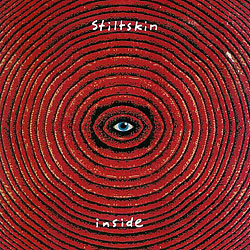 Inside
Inside
Here is the point where the expression übersong is in order. Inside is the nonplusultra on The Mind's Eye and the confirmation of what one could have expected the previous songs to progress to. As a single it reached the top spot in the UK charts. It is certainly Stiltskin's and Ray Wilson's best-known song ever and is a staple at all shows, be they Stiltskin shows, acoustic performances or Genesis Classic shows. Usually it would be an encore.
The praise is well-deserved. Having this unconventional choir intro before the song really takes off is a stroke of genius. The lyrics fit the mood perfectly. Thundering guitars are the central element of a monumental chorus while bass and Hammond shape the verses. The final chorus with its easily discernible backing vocals cannot be topped anymore and brings an impressive masterpiece to its end. Dynamism, power and a well-balanced instrumental arrangement come together for a flawless song. The success of the single may well have been the reason why this song was used as the opening track for the US version of the album – don't save the best for last.
It should be mentioned that Ray has brought out a remaster of this song on his 2004 solo album The Next Best Thing. It sounds cleaner and clearer, but it is shorter and cannot exploit its full potential because it seems a bit cut short.
An Illusion
After Rest In Peace, this is the second song that uses an unobtrusive flair right from the first beat. Ray's vocals are quiet, almost loving, well-suited for a song that is about someone who lived in an illusion that is real for them at night, in which they can achieve everything if they really want to. At day, however, they are confused by reality. The slightly convoluted lyrics point out that they do not mind much, though. The fragility is brilliantly presented and supported by the background vocals from the rest of the band. Sian Bell shines with what is most likely the best cello part on the album. The outro completes the illusion with typically dreamy guitar sounds.
America
Now we have reached the point where things could not be harder. The introduction gives you the feeling that giant waves of guitars are breaking over your head, and the guitar solo in the middle enhances that impression. The verse follows a clear line, in which Ray fires lots of imperatives ("you've got to…") at the listener. The chorus is (perhaps along with the choruses of Horse and Footsteps) the grungiest song part. It is extreme and biting. Ray rampages through the song with the line "America is me", which is answered by a much distorted, metallic "I'm in America". This part reminds of many hard rock songs and may leave many a listener uncomfortable – the song is intentionally over the top. America is a peculiar mutant of the kind that shows the other side to the gentle sounds of Illusion. Whether the idea is to point at the reality of crime in America is up to the individual listener. Someone who has never heard of America might get a bad impression of it.
It is not only the lyrics that are excessive – in the context of the album -, the lyrics follow that pattern, too. Still, the song is not arrogant but merely consistent. America was, interestingly, the final track on the US version of the album, which gave it a special significance.
When My Ship Comes In
The album moves towards its end and tries to create a dramatic mood. An acoustic guitar produces an exotic rhythm. The atmosphere is strange and oppressive, and the middle section has quite a long bit without any vocals – a good incision that underlines the emotionality of the song. When My Ship Comes In is the most sentimental and expressive song on the album, and a real highlight. A central motive is the recurring line „every beggar is Christ" that goes well with the psychedelic feeling. Ray's vocals complete the song; the melody of the verses resembles The Actor, a song Ray would release a decade later on his solo album The Next Best Thing.
The song moves on seamlessly into the finale, the instrumental…
Prayer Before Birth
„No synthesizers or guitar synths used on the track." The booklet is quite blunt about it. What we have here is a creative highlight. A blanket of Hammond sounds lends structure to the unorthodox song; the odd Wurlitzer piano and effect guitars are inserted to create this uniquely dreamy sound. Instrumentals like this may seem a bit unstructured, but it is obvious that a lot of thought has gone into this track, perhaps even more than into any other song on the album. Such a thoughful mood may well be the best way to end such an extroverted album. Because it is precisely not what one would expect.
No synthesizers or guitar synths used on the track".
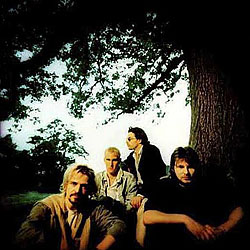 So ends an excellent album that has kept its distinctive character to
So ends an excellent album that has kept its distinctive character to
this day. It is actually a pity that there was no successor to this
album; it would have been great to see how Stiltskin might have
developed with this line-up. There were, however, some disputes between
the band and the label and also between Ray Wilson and Peter Lawlor about financial aspects. The title song of the Millionairhead album
by Cut is all about that. Cut was a band project Ray and his brother
Steve were involved in. The dissolution of Stiltskin became irreversible
when Ray obviously joined Genesis.
Since Wilson refounded
Genesis in 2005 there have been remarkable releases, both live and
studio albums, that are related to the 1994 Stiltskin sound but have
evolved from it. In that sense, The Mind's Eye is the foundation on
which the 2006 album SHE built.
One may ask what all this has to
do with Genesis. The thing is, Ray was hired as the singer by Tony
Banks and Mike Rutherford shortly after this album came out – and he did
not have many other references. The Mind's Eye was therefore crucial
for his employment in Genesis; apparently his vocal performance on the
album was so impressive that he was hired as Collins' successor.
Stiltskin's debut album has left a mark on Ray's career in that it marks
its beginning.
By Ole Uhtenwoldt
English by Martin Klinkhardt

